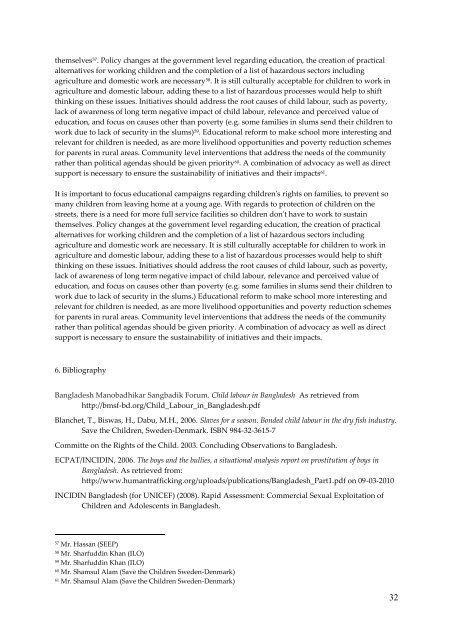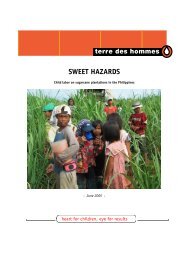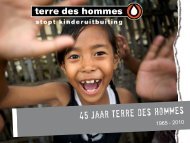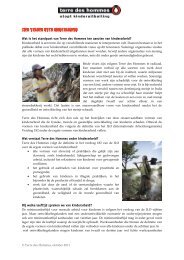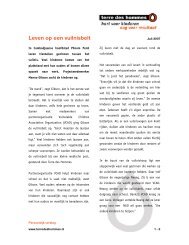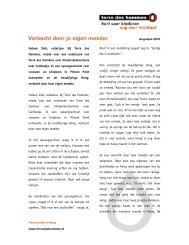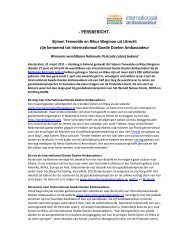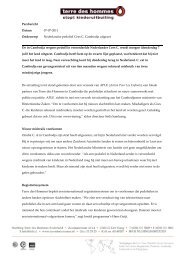Untitled - Terre des Hommes
Untitled - Terre des Hommes
Untitled - Terre des Hommes
- No tags were found...
You also want an ePaper? Increase the reach of your titles
YUMPU automatically turns print PDFs into web optimized ePapers that Google loves.
themselves 57 . Policy changes at the government level regarding education, the creation of practical<br />
alternatives for working children and the completion of a list of hazardous sectors including<br />
agriculture and domestic work are necessary 58 . It is still culturally acceptable for children to work in<br />
agriculture and domestic labour, adding these to a list of hazardous processes would help to shift<br />
thinking on these issues. Initiatives should address the root causes of child labour, such as poverty,<br />
lack of awareness of long term negative impact of child labour, relevance and perceived value of<br />
education, and focus on causes other than poverty (e.g. some families in slums send their children to<br />
work due to lack of security in the slums) 59 . Educational reform to make school more interesting and<br />
relevant for children is needed, as are more livelihood opportunities and poverty reduction schemes<br />
for parents in rural areas. Community level interventions that address the needs of the community<br />
rather than political agendas should be given priority 60 . A combination of advocacy as well as direct<br />
support is necessary to ensure the sustainability of initiatives and their impacts 61 .<br />
It is important to focus educational campaigns regarding children's rights on families, to prevent so<br />
many children from leaving home at a young age. With regards to protection of children on the<br />
streets, there is a need for more full service facilities so children don't have to work to sustain<br />
themselves. Policy changes at the government level regarding education, the creation of practical<br />
alternatives for working children and the completion of a list of hazardous sectors including<br />
agriculture and domestic work are necessary. It is still culturally acceptable for children to work in<br />
agriculture and domestic labour, adding these to a list of hazardous processes would help to shift<br />
thinking on these issues. Initiatives should address the root causes of child labour, such as poverty,<br />
lack of awareness of long term negative impact of child labour, relevance and perceived value of<br />
education, and focus on causes other than poverty (e.g. some families in slums send their children to<br />
work due to lack of security in the slums.) Educational reform to make school more interesting and<br />
relevant for children is needed, as are more livelihood opportunities and poverty reduction schemes<br />
for parents in rural areas. Community level interventions that address the needs of the community<br />
rather than political agendas should be given priority. A combination of advocacy as well as direct<br />
support is necessary to ensure the sustainability of initiatives and their impacts.<br />
6. Bibliography<br />
Bangla<strong>des</strong>h Manobadhikar Sangbadik Forum. Child labour in Bangla<strong>des</strong>h As retrieved from<br />
http://bmsf-bd.org/Child_Labour_in_Bangla<strong>des</strong>h.pdf<br />
Blanchet, T., Biswas, H., Dabu, M.H., 2006. Slaves for a season. Bonded child labour in the dry fish industry.<br />
Save the Children, Sweden-Denmark. ISBN 984-32-3615-7<br />
Committe on the Rights of the Child. 2003. Concluding Observations to Bangla<strong>des</strong>h.<br />
ECPAT/INCIDIN, 2006. The boys and the bullies, a situational analysis report on prostitution of boys in<br />
Bangla<strong>des</strong>h. As retrieved from:<br />
http://www.humantrafficking.org/uploads/publications/Bangla<strong>des</strong>h_Part1.pdf on 09-03-2010<br />
INCIDIN Bangla<strong>des</strong>h (for UNICEF) (2008). Rapid Assessment: Commercial Sexual Exploitation of<br />
Children and Adolescents in Bangla<strong>des</strong>h.<br />
57<br />
Mr. Hassan (SEEP)<br />
58<br />
Mr. Sharfuddin Khan (ILO)<br />
59<br />
Mr. Sharfuddin Khan (ILO)<br />
60<br />
Mr. Shamsul Alam (Save the Children Sweden-Denmark)<br />
61<br />
Mr. Shamsul Alam (Save the Children Sweden-Denmark)<br />
32


